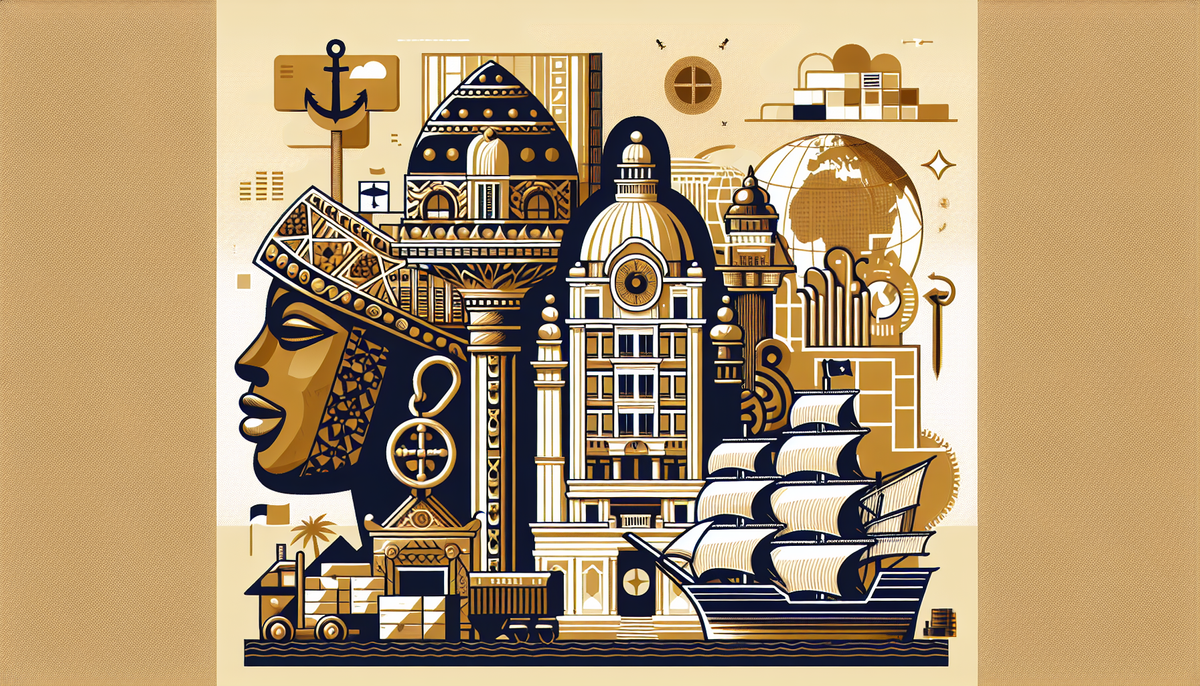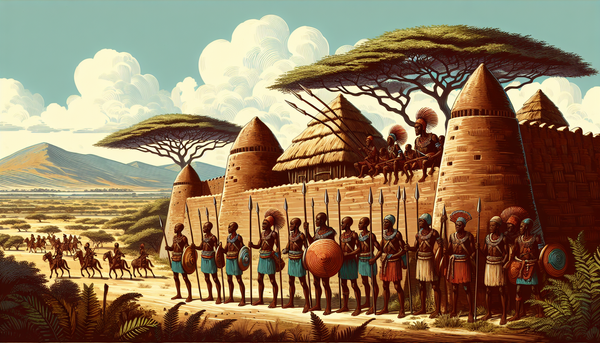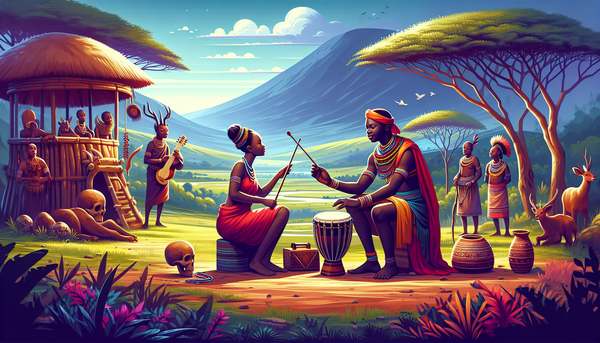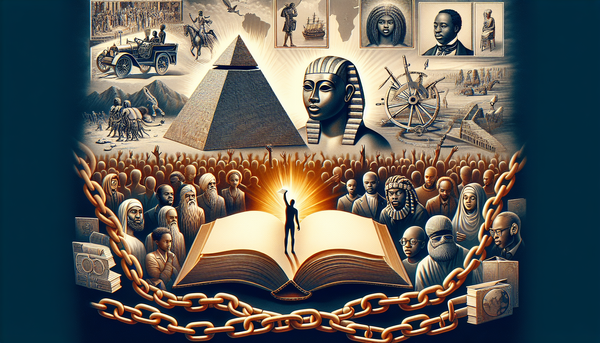The Interactions Between African Kingdoms and European Powers

Origins of European Contact with African Kingdoms
The roots of European contact with African kingdoms can be traced back to the late 15th century, coinciding with the Age of Exploration. Motivated by a desire for new trade routes and resources, European powers, particularly Portugal and Spain, set sail along the African coast. The exploration began in earnest around 1488 when Bartolomeu Dias rounded the Cape of Good Hope, opening up sea routes to India and the Far East.
This newfound maritime access brought Europeans into direct contact with various African kingdoms, including the Akan, Mali, and Kongo. Early interactions primarily revolved around trade, with Europeans exchanging goods like cloth, metalwork, and firearms for gold, ivory, and slaves. The establishment of trading posts, such as Elmina Castle in Ghana, facilitated these exchanges and marked the beginning of a complex relationship that would evolve over the centuries.
While the initial interactions were focused on commerce, they soon took on more political and military dimensions. European powers became increasingly interested in the internal dynamics of African societies, leading to alliances and conflicts that would shape the continent’s future. This early period set the stage for the profound transformations that colonial ambitions would later impose on African kingdoms.
Trade Dynamics in the Pre-Colonial Period
In the pre-colonial period, trade between African kingdoms and European powers thrived, showcasing a complex web of economic interactions. African kingdoms such as the Mali Empire, the Kingdom of Kongo, and the Ashanti Empire were pivotal players in transcontinental trade networks. They engaged in the exchange of gold, ivory, salt, and textiles, which were highly valued in European markets.
The Portuguese were among the first Europeans to establish lucrative trading posts along the coasts, particularly in West Africa. These posts served as hubs for commerce and facilitated the interaction of diverse cultures. European traders sought African commodities, while African merchants eagerly acquired European goods, including firearms, metal tools, and luxury items. This exchange not only enhanced local economies but also shifted power dynamics within African societies.
Additionally, the trade routes connected African kingdoms with broader global networks, including Islamic and Asian markets, leading to the circulation of ideas, technologies, and cultural influences. Trade agreements and partnerships were often negotiated, reflecting the political sophistication of African leaders. While this dynamic trade fostered mutual dependence and economic growth, it also laid the groundwork for the later exploitation and conflicts that would arise with the intensification of European colonial ambitions.
Diplomatic Engagements and Treaties
As European powers sought to expand their influence in Africa, diplomatic engagements and treaties became central to interactions between European powers and African kingdoms. These engagements often involved negotiations over trade, territorial control, and alliances, reflecting the complexity of political relationships at the time.
One notable instance was the relationship between the Kingdom of Kongo and the Portuguese. In the late 15th century, King Nzinga a Nkuwu converted to Christianity and established formal diplomatic relations with Portugal. This alliance was solidified through treaties that facilitated trade and military cooperation, benefitting both parties. The Kongo's strategic location provided Portugal access to valuable resources and furthered European interests in the region.
However, not all diplomatic encounters were based on equality. Many treaties imposed unfavorable terms on African rulers, often reflecting the asymmetrical power dynamics of the time. Treaties were sometimes used to legitimize European claims over territory or to control trade routes.
In addition to trade agreements, diplomatic missions were common, with African ambassadors traveling to Europe and European diplomats visiting African courts. These exchanges were crucial in shaping perceptions and strategies, highlighting a multifaceted relationship that combined elements of collaboration and exploitation. Such diplomatic engagements laid the groundwork for future colonial endeavors across the continent.
Military Conflicts and Alliances
The interactions between African kingdoms and European powers in the pre-colonial period were marked by both military conflicts and strategic alliances, illustrating the complexities of power relations on the continent. As trade relations expanded, so too did the competition for influence and control of resources, leading to confrontations.
European powers, particularly the Portuguese, Spanish, and later the British and French, often entered into military engagements with African kingdoms. These conflicts were sometimes initiated by European attempts to dominate trade routes or suppress resistance to their growing influence. For instance, the Ashanti Empire engaged in conflicts with the British as they sought to protect their gold trade and territorial integrity.
Conversely, alliances formed between European powers and certain African kingdoms provided mutual benefits. Some African rulers sought European firearms and military support to consolidate power or defend against rival states. The Kingdom of Kongo, for example, allied with Portugal to gain military advantages against its foes, while also benefiting from European technologies and trade.
These military dynamics often resulted in significant shifts in local power structures and contributed to the overall instability in the region. Military conflicts and alliances exemplified the strategic maneuvering employed by both Europeans and African rulers, shaping the trajectory of future interactions and colonial endeavors.
Cultural Exchanges and Influences
The interactions between African kingdoms and European powers during the pre-colonial period paved the way for significant cultural exchanges and influences that reshaped societies on both sides. As trade flourished, so did the movement of people, ideas, and customs, creating a rich tapestry of cultural interaction.
African kingdoms were not merely passive recipients of European culture; they actively engaged with and adapted various European influences. For instance, the introduction of Christianity by European missionaries in regions such as the Kingdom of Kongo led to the establishment of churches and schools, altering social structures and educational systems. Many local leaders embraced Christianity, integrating it into their governance while retaining traditional beliefs.
Simultaneously, Europeans were influenced by African art, music, and customs. The vibrant textiles, intricate carvings, and unique rhythms of African societies captivated European traders and explorers, showcasing the continent's rich cultural heritage. These exchanges fostered a mutual curiosity, leading to hybrid forms of expression, particularly in areas like music and dance.
However, these cultural interactions were not devoid of tension. European depictions of African cultures often relied on stereotypes, which distorted perceptions and justified exploitative practices. Nevertheless, the cultural exchanges during this period laid the groundwork for deeper interactions and complex identities, affecting future relationships between Africa and Europe.
Economic Impacts on African Societies
The economic interactions between African kingdoms and European traders during the pre-colonial period had profound and varied impacts on African societies. Initially, the influx of European goods and the establishment of trade routes catalyzed economic growth and diversification. African kingdoms like the Mali Empire and the Kingdom of Kongo benefited from the exchange of gold, ivory, and salt for European textiles, metal goods, and firearms. This trade enriched local elites and stimulated the overall economy.
However, the economic landscape was also marked by disruption. The increasing demand for enslaved people by European traders led to the rise of a brutal slave trade that decimated communities. As some African societies engaged in the transatlantic slave trade, they often found themselves caught in conflict with neighboring states, leading to social fragmentation and instability.
Additionally, the introduction of European currencies and trade systems altered traditional economies, causing shifts in local practices and economic dependence on European markets. This reliance undermined indigenous economic systems and increased vulnerability to external pressures. While some societies thrived economically in the short term, the long-term consequences included distorted economies and social structures, setting the stage for further exploitation and challenges during the colonial era and beyond.
Legacy and Historical Assessments
The legacy of pre-colonial interactions between African societies and European powers is complex, marked by both collaboration and conflict, and continues to shape contemporary understandings of historical relations. These early engagements laid the groundwork for the later colonial period, embedding patterns of economic dependency and sociopolitical fragmentation in African societies that would have enduring consequences.
Historians assess this period as a time of dynamic exchange, where African kingdoms exhibited agency and resilience amidst European encroachment. While some narratives focus on the exploitative aspects of the transatlantic slave trade and military conflicts, others emphasize the strategic adaptations made by African leaders, who negotiated alliances and incorporated foreign influences into their culture and governance.
The cultural exchanges that occurred led to the evolution of hybrid identities and practices, showcasing the creativity and adaptability of African societies. However, the lasting impacts of colonialism, fueled by the patterns established in the pre-colonial period, have prompted a reevaluation of historical assessments. Scholars now emphasize the importance of understanding these interactions as formative rather than purely detrimental, recognizing African contributions to global trade and cultural exchange, and advocating for a more nuanced view of history that appreciates the complexities of these legacies.



